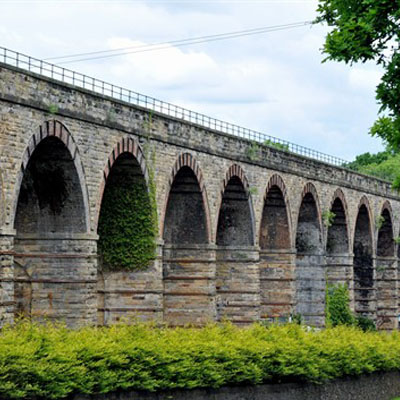
There aren’t a lot of the men of 1970 around, but I valued your Monthly Reports while on the Economy, Energy and Tourism Committee at Holyrood. I still consult them as I revise three books – No Gods, The Oxford Short History of Scotland, Fool’s Gold – for new editions. But Mackay on railways – trying to stop the Borders Railway when the bulldozers are out north of Gala? And voicing this in Bill Jamieson’s neo-liberal Cave of Adullam, Scotbuzz? No way.
In 1969, as our line was being ripped up, I went as founder-historian to the Open University, 1969-80 and then became Professor of British Landeskunde (Regional Studies) at Tuebingen University. The post turned out a successful Small and Medium Enterprise (SME) – providing training and jobs for students, distance-learning projects and consulting work. Land Baden-Wuerttemberg gave useful tax-breaks, but I was helped above all by its transport policy.
Good provision for walkers and cyclists and excellent public transport (a fourfold growth in bus passengers in Tuebingen after 1980, with routes up from eight to 23) meant I didn’t have to run a car, avoiding expense, delay, danger and interruption of writing and research. See Deep-Fried Hillman Imp: Scotland’s Transport (2001). Copies were bulk-bought by the Chinese. They had their reasons. It was based on an article written in 1988 – fateful year – for the German Design Council; stressing local railways as the physical spine of SME development: mobility in work and training was as important as the publicly owned banks.
With Eberhard Bort, now of Edinburgh University’s Governance Institute, I have run the annual Freudenstadt Forum on European Regionalism for the Social Democrats’ Friedrich Ebert-Stiftung since 1991 – for which inter alia Berlin awarded its ‘Bundesverdienstkreuz’ in 2012. The Forum can only exist through Freudenstadt’s rail network, once threatened, now largely electrified. Such factors contribute to BaWue’s position as Europe’s prime industrial region, with 35% of GDP in eco-hi-tech manufacture. Scotland scrapes 10%.
[quote]Scotland’s annual spend of £12 billion on roads and cars brings pollution and inefficiency – and within 20 years the knife will fall.[/quote]
Being on the EET Committee, 2007-11 tested arguments made in ‘Grasping the Thistle’, a plea for devolution for the BBC’s Scotland 2000 in 1987 and ‘Bourgeois Regionalism’ a paper for the Scottish Council’s Aviemore Conference on Scotland and Europe, 1988. I faced neo-liberal triumphalism when co-chair of the Baden-Wuerttemberg Forum on Regional Development, 1996. Momentarily the flash rhetoric of their ‘weightless economy’ (curiously similar in style to Trotskyism) assailed the social framework described above. Then the engineers of Karlsruhe, providing with tram-trains the seamless co-ordination of rail and bus, made a palpable ‘social saving’. This we must emulate. Scotland’s annual spend of £ 12 billion on roads and cars brings pollution and inefficiency – and within 20 years the knife will fall.
As principal carer to 95-year-old parents, one is constrained for mobility; involvement remains with transport/civic concerns: President, Scottish Association for Public Transport, life member of Saltire Society, director of the Scottish Review of Books, etc, along with various energy and conservation projects, both here and in Aberystwyth, where I’m Visiting Prof of Politics – and ten years with the Campaign for Borders Rail, actually founded by a German planner, Petra Biberbach.
In 2007 we had to take on the anti-rail Borders Party, and the CBR got the fares saved by my ‘pensioners’ pass’: £5,000 over my Holyrood years. The grind of two-hour trips to Edinburgh on freezing buses still enabled reading and writing. Hiring a 4×4 taxi for an important division when the roads were otherwise blocked by snow in 2010 cost me £120 (not claimed for as it was party, not parliamentary business) gave an educative example of the real costs of our car economy, just when ‘social marketism’ showed neo-liberalism the door. You, Battling Bill Jamieson or Tom Miers aren’t going to close down the Border project, though in Germany it would have been simpler, cheaper and now in use. Construction has started. The stub-line as far as Gorebridge that you seem to want is actually the pricey bit: four miles of bridging and tunnelling where projects like the Edinburgh by-pass severed the route. Thank you, Alistair Darling, quondam Edinburgh Transport Convenor. The track to Tweedbank-Abbotsford is little impeded.
Opponents of the Borders line seem largely Embro finance wizards who prudently shifted their bonuses into big houses, land and SUVs before 2008, and want a quiet life. Uncovering where finance got us led to my Broonland: The Last Days of Gordon Brown (Verso, 2010). The reckoning on this has yet to be settled. I am an old Benthamite of the ‘consistency and ferocity’ school, the help of the penitent is always welcome. In ‘Beeching at Fifty’ year, get out and see a rail renaissance worldwide.
[footer]Its time has come. Aberystwyth (smaller than Gala and on a line ‘doomed’ in the 1960s) shows what can be made of regional rail, even if the trains are run by Deutsche Bahn.[/footer]
